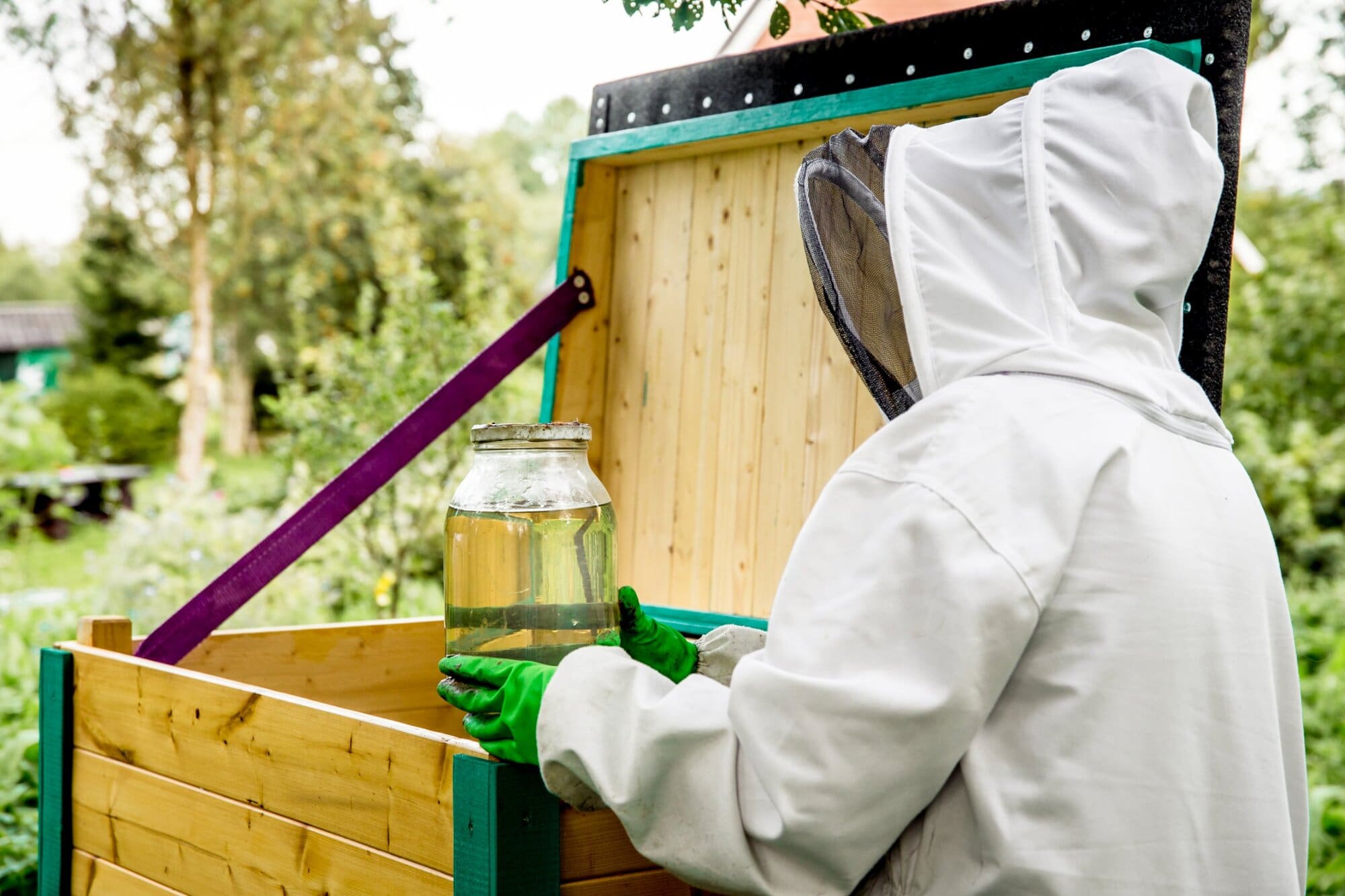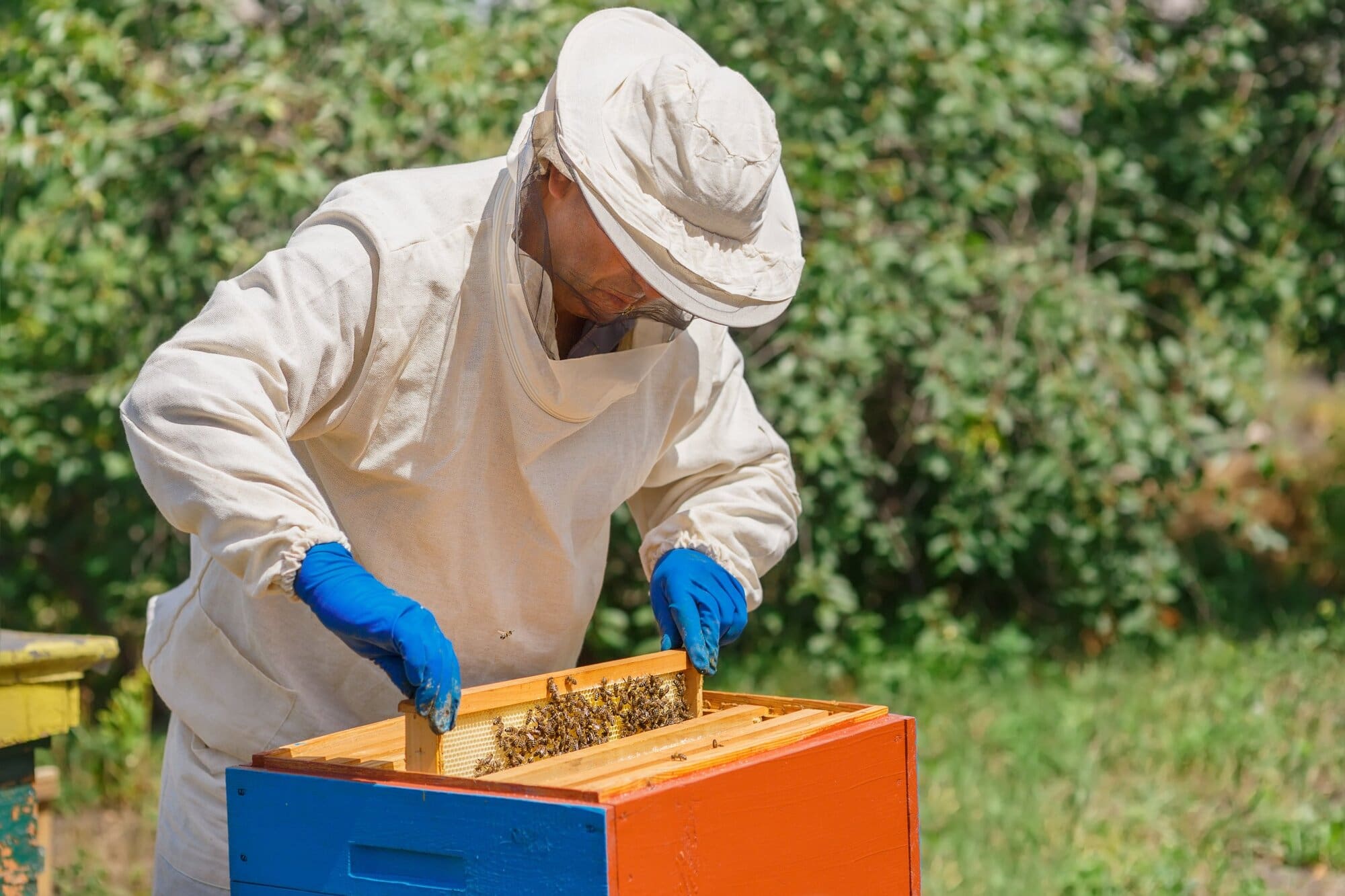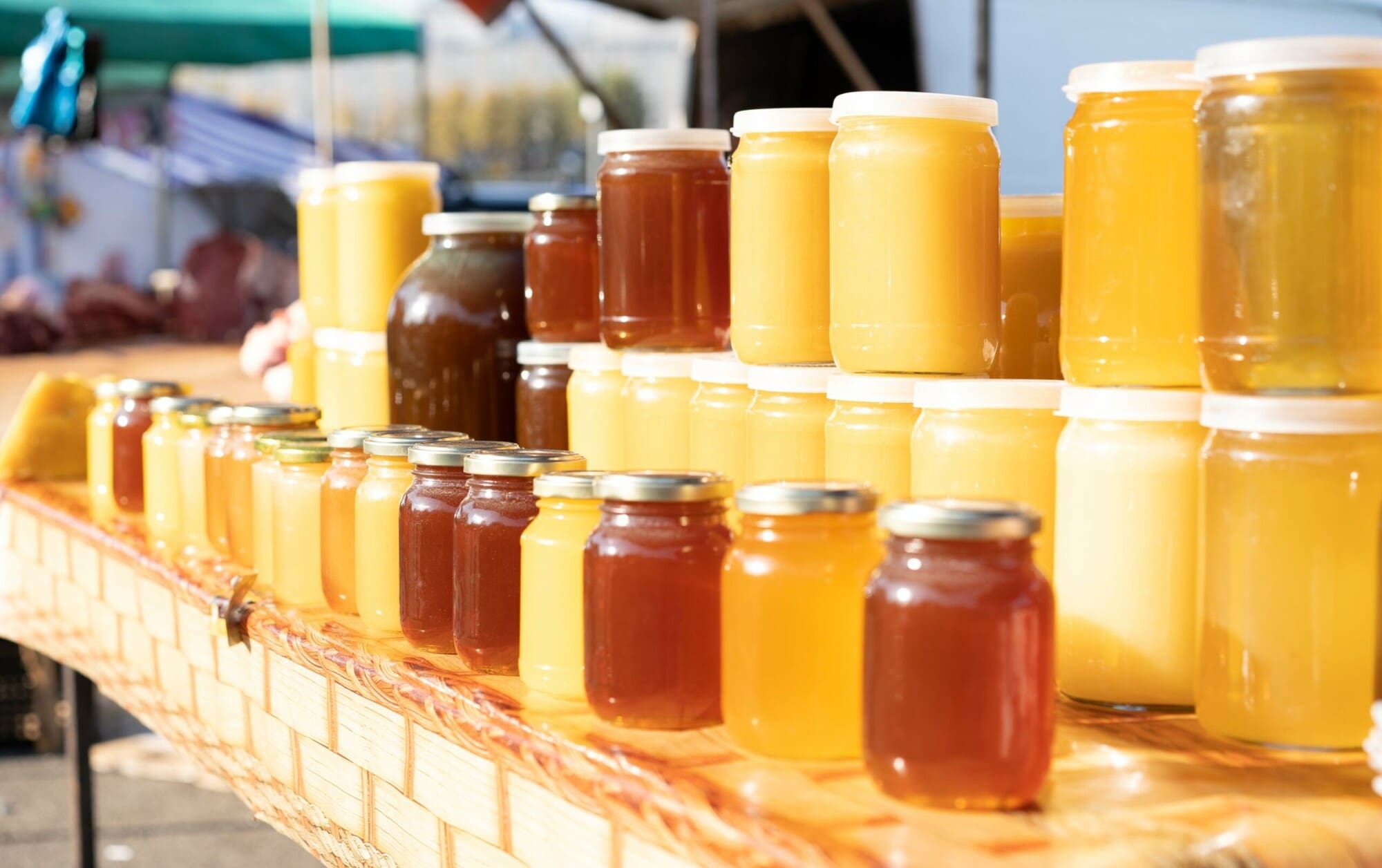In this Beekeeper Career Guide
What Does A Beekeeper Do?
A beekeeper is sometimes also known as an apiarist, apiculturist, bee farmer or honey farmer who looks after colonies of honeybees (Apis mellifera) kept in hives. Beekeepers mainly keep honeybees for honey production and other byproducts. However, they may also keep them for pollination services, e.g. crops.
There are many different types of beekeepers, including:
- Hobby beekeepers – keep bees as a hobby.
- Sideline (non-commercial) beekeepers – individuals who keep bees for a bit of extra income but do not rely on it solely.
- Commercial beekeepers – individuals and companies who keep bees for profit alone.
Most beekeepers are hobby beekeepers. However, there are careers available, and individuals can choose to be self-employed, freelance or work as an employee for a company. They will typically work outside on a farm or bee yard with the bees and hives in all weathers. They may also work in an office to complete any necessary administrative tasks and even a laboratory or processing/packing facility if there is one on-site.
Beekeepers may work with other beekeepers and colleagues (including agency staff or freelancers). They may also be required to liaise with other external stakeholders, e.g. customers, suppliers, delivery/collection companies, landowners, farmers, Local Authority Environmental Health Officers (EHOs), Trading Standards Officers (TSOs), Veterinary Medicines Directorate (VMD), Animal and Plant Health Agency (APHA) and beekeeping associations.
A beekeeper’s tasks will depend on the season, but general activities will include maintaining beekeeping equipment, looking after and inspecting the hives and bees, managing the surrounding land, treating for diseases and pests, and collecting and processing honey and other products. The role may also require ad hoc administrative work, such as recording and report writing.
A beekeeper’s main aim is to ensure the honeybee colonies remain healthy, disease-free and productive, so they continue to produce honey and other products, such as royal jelly, beeswax and pollen or provide essential pollination services. They must also follow food safety and hygiene guidelines when collecting and processing honey.
The environment in which beekeepers work will depend on the type and scale of the business. Some may choose self-employment and work from home (if they have sufficient space and land).

Responsibilities
The day-to-day responsibilities a beekeeper has will depend on the season, but some duties can include (this list is not exhaustive):
- Building, repairing and cleaning hives and other beekeeping equipment.
- Maintaining the surrounding land and plants (it is important to have enough floral resources (nectar and pollen) for the honeybee colony sizes to prevent competition with wild bees, such as bumblebees and solitary bees).
- Feeding the bees (sometimes in autumn).
- Introducing new colonies and dividing them where necessary.
- Breeding or replacing queen bees and setting up smaller starter colonies.
- Looking after honeybee colonies to ensure they are healthy.
- Calming agitated bees using a smoker.
- Inspecting hives for signs of disease, pests and parasites, and treating where necessary.
- Destroying untreatable diseased bee colonies.
- Removing parasites and vermin.
- Hefting, which is lifting the hive corners to check for honey levels.
- Inserting honeycombs into hives.
- Harvesting honey, royal jelly and beeswax.
- Preparing, jarring, bottling, packing and labelling honey and other products.
- Marketing and selling honey, royal jelly or beeswax.
- Collecting swarms.
- Writing reports and planning for the busy season.
- Keeping detailed records, e.g. health, honey production, diseases and treatments.
More experienced beekeepers may be responsible for mentoring or training new beekeepers.
Working Hours
A beekeeper can expect to work 37–42 hours a week depending on the requirements of their role and the company’s needs or whether they are self-employed or freelance. The more hives and bees, the longer the working hours.
Working hours will also depend on the season. Longer hours are usual during busier times, e.g. breeding season and harvesting (spring and summer). However, there are likely to be quieter periods, especially in winter.
Being a beekeeper is not a 9–5 job, and those looking at entering this profession must be committed to working unsociable hours. There may be a requirement to work evenings, nights, weekends and bank holidays.
Travel may be a requirement for a beekeeper, depending on the number of hives and locations, lengthening the working day. There may be opportunities to travel and work overseas with the right skills and experience.

What to Expect
There are many positives to being a beekeeper, especially if an individual has a passion for bees and loves working outdoors. Looking after honeybees and ensuring they are happy and healthy can give beekeepers a real buzz (sorry!). But seriously, it is extremely rewarding and why so many people choose to keep bees as a hobby. Harvesting the first batch of honey can be an incredible experience.
Another plus is that there are no set qualifications for becoming a beekeeper. However, individuals must be prepared to read, learn and research honeybees and beekeeping. It will also require certain skills.
Being a self-employed beekeeper and having an opportunity to be your own boss can be attractive. It can give individuals the independence to take charge of their own standards and goals and manage their own working hours. There is also support within local beekeeping associations, so being self-employed does not necessarily mean working alone.
Even though being a beekeeper is rewarding, and there are many positives, it is also important to consider the cons and challenges, for example:
- Physical demands – being a beekeeper is physically demanding work. They can get very busy during the peak summer season, especially when harvesting. Individuals can spend a lot of their time on their feet and may need to carry out manual handling as part of the role.
- Diseases and pests – there are many threats to honeybees, production and pollination. Diseases, pests and parasites can adversely impact the quantities of honey, royal jelly and beeswax produced. In severe cases, bees can die, putting the colony at risk. There may be instances where diseased bee colonies are destroyed. Therefore, individuals must be prepared for this possibility.
- Difficult working conditions – beekeepers predominately work outdoors, which means working in all weathers. They also have to wear protective clothing, including the beekeeping veil. In the height of summer, this can get hot, sweaty and uncomfortable.
- A lack of employed roles – permanent employed beekeeping roles are not easy to come by in the UK and are rarely advertised. Those advertised tend to be temporary, contract and freelance roles within bee farming. If an individual is looking for an employed role, it may take some time. Therefore, it is important to network and establish connections within beekeeping, as it may open up some opportunities. Some gardening roles may also involve beekeeping if there are hives on the land. There are more overseas commercial beekeeping roles if this is an option.
- Expense – being a self-employed beekeeper and having your own business can be expensive, especially when first starting. There are various expenses, including equipment, e.g. hives, smokers, beekeeping suits and veils, and other tools. There also needs to be enough land and pollen/nectar sources for the number of hives/size of the colonies. Training costs also need to be factored in.
- Bees sting – female honeybees sting, so if an individual is allergic, it is probably not the best career choice. Even if someone is not allergic, being stung is an occupational hazard of being a beekeeper. Beekeepers do wear protective equipment, but the occasional sting is not unusual.
Every career choice has pros and cons, and prospective beekeepers must know what to expect before deciding whether it is a suitable career. It can be a physically demanding role that requires work in all weathers, and the hours can be unsociable. However, there are many positives too, and those who become a beekeeper really love what they do.
When considering whether to be a beekeeper, individuals should look at the pros and cons. They should also ensure they have the right personal qualities to carry out the role and responsibilities required.
Personal Qualities Needed To Be A Beekeeper
Some of the personal qualities that a beekeeper requires will include (this list is not exhaustive):
- The ability to wear whole-body protective clothing.
- A passion for honeybees and their produce.
- A passion for working outside and remaining enthusiastic in all weathers.
- Not afraid of bees and being stung (there may also be other insects and pests to deal with, e.g. mites, hornets and rodents).
- Knowledge of honeybee biology/behaviour and beekeeping.
- Knowledge of beekeeping legislation (bees, diseases and honey).
- Knowledge of plants and pollination.
- Knowledge of food safety and hygiene and HACCP (if handling honey).
- Knowledge of health and safety.
- The ability to work both in a team (if working with others) and alone using own initiative.
- Observation and recording skills.
- Thinking, analytical and reasoning skills.
- Time management skills.
- Having practical skills and can work effectively with their hands.
- Good problem-solving skills, especially if something goes wrong with the hive.
- Thorough, accurate and having attention to detail.
- Caring, calm and empathetic.
- The ability to work under pressure, be patient and persistent and remain calm in stressful situations.
- The ability to use IT equipment for basic tasks, e.g. writing reports and records.
- The ability to work with and maintain various equipment and tools.
Qualifications
There are many different ways to become a beekeeper. This could include taking a course from a private company or joining an apprenticeship beekeeping scheme.
College
- Course levels – short introductory courses and level 1.
- Entry requirements – there are usually no specific entry requirements, but some may require experience working with honeybees for a season.
- Example courses – beekeeping taster days, Level 1 Award in Introduction to Beekeeping and beekeeping basic and improvers courses.
- Various courses can be found on the British Beekeepers Association (BBKA) website.
- Some private companies offer beekeeping diploma courses as well as experience days.
Apprenticeship
Some larger bee farmers and honey producers have apprenticeship beekeeping schemes.
Entry requirements – there are usually no specific entry requirements. Further information on apprentice courses .

On the Job Training And Volunteering
There is no requirement to have specific qualifications to become a beekeeper, although having a degree in a biological field may be useful. Some employers may require individuals to have had certain training and experience. Individuals must at least have an interest in beekeeping.
Another route into beekeeping is starting it as a hobby and learning on the job. BBKA has further information on its website on taking beekeeping up as a hobby. Individuals can also join a local beekeeping group/association to learn from experienced beekeepers. They may also be able to offer further training.
Alternatively, if an individual has not got the space, finances and time, they could look at volunteering with charities, e.g. hospices and conservation, or gardening groups. Volunteering can also help individuals understand what is involved in being a beekeeper and help them build their knowledge and skills. There is information on volunteering and local opportunities on Do-IT, NCVO and Volunteering Matters.
There is no substitute for practical experience. It can help individuals when applying for a career in beekeeping and can also help them set up their own business if they want to go down this route. Even amateur community courses on beekeeping can count.
Training courses
Attending relevant training courses and having additional certifications can help individuals enter the beekeeping profession, enhance their employability and give them a competitive edge when selling their own honey and associated produce. Many colleges and accredited private training providers can provide training courses online, face-to-face or both.
Some examples of relevant courses that may be useful for beekeepers and honey producers/sellers include (this list is not exhaustive):
- Food hygiene and HACCP (honey handling).
- Allergen awareness (bee stings and allergies, including food allergens).
- Honey packaging and labelling (specific laws for honey labelling).
- Additional health and safety training, e.g. hazardous substances (COSHH), manual handling, lone working, personal protective equipment (PPE) and fire.
- First aid.
- Pest identification, management and control.
- Gardening and planting for pollinators.
- Customer service skills (selling honey and other products).
- Business management (if self-employed).
There are also courses in specific areas of beekeeping, such as:
- Beekeeping legislation.
- Honeybee biology and behaviour.
- Honeybee diseases and pests.
- Microscopy for identifying hive pests and pathogens.
- Hive management.
Associations, such as the British Beekeepers Association (BBKA), the Bee Farmers Association (BFA), the National Bee Unit and local beekeeping associationss can also advise on reputable training courses. Some also provide events to help individuals become beekeepers, giving them the means to continue their professional development.
As mentioned, employment opportunities are extremely limited within the UK, so it is difficult to pinpoint what training employers want. It may be worth regularly looking on job sites to see if any roles are available, e.g. GOV.UK find a job service, Indeed, LinkedIn, and other job sites. Overseas job adverts may also be a useful guide for identifying training needs.
If beekeepers have more relevant training and competence (skills, experience and knowledge), it will open up more opportunities. Refresher training will also be required, as it is a legal requirement under health and safety and food hygiene legislation and keeps knowledge and skills up to date.

Registering
If an individual wants to sell their own honey, they will usually need to register with their Local Authority at least 28 days before they start trading. It is advisable to contact them for advice anyway, as some Local Authorities may not permit beekeeping in a particular area, or a licence may be required.
The BBKA also recommends joining BeeBase, a National Bee Unit registration scheme with many benefits, including diseases and pests alerts.
Being self-employed
There are additional responsibilities associated with being self-employed, for example:
- Having the correct insurances, i.e. public liability and home/car business. If employing anyone, employer’s liability insurance will be required.
- Registering with HMRC.
- Filing tax returns.
- Registering with the ICO to hold personal data (to comply with the Data Protection Act 2018 and the GDPR).
Further advice and guidance on being self-employed can be found on GOV.UK.
Driving
Beekeepers may have to use a vehicle to get to hives, depending on their locations and distance. Therefore, they should have a full clean driving licence and may also require business insurance.

Where Do Beekeepers Work?
Most beekeepers do it for a hobby or are self-employed or freelance. Some may also work for commercial companies, and others may volunteer for charities.
Beekeepers can work in areas such as (this list is not exhaustive):
- Bee yards.
- Orchards.
- Farms.
- Woodlands.
- Fields.
- Gardens (even rooftops).
- Allotments.
- Private estates.
- Learning and beekeeping centres.
- Production facilities (for honey and other products) or kitchens.
- Workshops (building and repairing hives and maintaining equipment).
- On-site laboratories.
- Markets, fairs and other events (to sell products).
- Offices (for admin).
Working as a beekeeper outside in all weathers can be challenging. Having full-body protective clothing on can make working conditions even more difficult.

How Much Do Beekeepers Earn?
What beekeepers will earn is variable, as most are self-employed and will set their own rates and costs for their products. It will also depend on:
- The size of their operation.
- The type of products offered.
- The number of products produced and sold.
- Their expenses, e.g. equipment, utilities, tax, National Insurance and training.
According to Indeed, the average UK salary for employed beekeepers in March 2022 was £36,216 per year. Voluntary beekeeping roles will be unpaid, but some may get expenses for travel and equipment.
As an apprentice, the salary will depend on an individual’s age and how long they have been in their apprenticeship. Apprentices must earn at least the current National Minimum Wage (NMW). Some employers will pay more than this. However, it will depend on the organisation and role on offer.

Types Of Beekeeping To Specialise In
Beekeepers will range from novices to experts, depending on their knowledge, experience and skills. They can also take up urban, suburban or rural beekeeping.
There are also different types and methods of beekeeping, including:
- Traditional beekeeping – using ancient methods/equipment in beekeeping, e.g. keeping bees in fixed comb hives with a hollowed structure, such as trees, pots and boxes. Historically, skeps (traditional woven baskets) or boles (wall alcoves) were used. Today, traditional methods with fixed combs are not typically used in the UK, as they can be problematic. They cannot be touched without damaging the comb, can be dangerous to the public, and may be unlawful in some areas due to the impracticality of inspection. It may be possible to incorporate some traditional ways into beekeeping practices, on which associations may advise.
- Modern beekeeping – using more modern methods, i.e. moveable frame hives, in beekeeping, for example:
Top-bar (horizontal) hives – are often seen as a traditional method and are lighter than others. It does not have frames. Therefore, it can be a cheaper option. However, it does have its disadvantages, such as low honey production, so it is better suited for smaller-scale operations.
Vertically stackable hives – are the most common hives in the UK. It includes the Langstroth hive, British national hive, Square Dadant hives, and Rose hive. They contain removable frames. - Commercial beekeeping – keeping hundreds of hives for large-scale honey, beeswax and royal jelly production. These tend to be bee farms passed down generations.
- Non-commercial beekeeping – smaller scale production with fewer hives.
- Organic beekeeping – following organic standards, e.g. no pesticides, using only natural substances, locating hives in organically farmed areas, organic disease/pest treatments, etc.
- Beekeeping for pollination – some beekeepers may not be involved in honey or byproduct production. They may specialise in pollination services for fruit, vegetables and other crops.
Individuals can also specialise in mono-floral honey, e.g. orange blossom, pure clover and heather. However, they must ensure the hives are away from other floral sources.
Beekeepers will tend to carry out similar responsibilities. However, there may be an opportunity to specialise in certain areas, especially with large commercial companies, e.g. hive and equipment inspection, pests and diseases (microscopy) identification and treatment, honey collection/processing, queen rearing, bee breeding and swarm removals.
All types of beekeeping will require differing knowledge, skills, experience and qualities. However, most beekeepers need to know about honeybee biology and behaviour and their pests and diseases. They will also need to know how to handle honeybees safely and manage their hives according to the seasons. Any additional areas of expertise will depend on the type of beekeeping an individual wants to carry out.
If honeybees and their hives are not handled and managed safely, it can cause injury to the bees, beekeepers and others. Beekeepers have a duty of care to their bees and people. They can also break the law if they do not understand their responsibilities. Therefore, beekeepers must be competent and not carry out tasks if they do not have the correct training, experience and skills.

Professional Bodies
Standards, diseases and pests, beekeeping techniques/equipment and laws are regularly changing. Therefore, beekeepers must keep abreast with the latest developments and changes in legislation to remain legally compliant and ensure they keep their bees and hives healthy and productive. Continuing professional development (CPD) gives beekeepers the knowledge and skills to keep up to date with these changes and understand their responsibilities.
Joining an association can help prospective and current beekeepers enhance their skills and overall career. British Beekeepers Association (BBKA), the Bee Farmers Association (BFA), the National Bee Unit and local beekeeping associations offer different levels of membership, CPD, training and events.
There are many opportunities for those who want to progress in beekeeping. With more training, knowledge and experience, a beekeeper could:
If self-employed
- Sell specific honey, e.g. orange blossom.
- Provide pollination services.
- Develop more hives over a wider area.
- Move into commercial bee farming.
- Work for a beekeeping association.
If employed:
- Lead a team or become a manager.
- Become self-employed.
- Work overseas.
Knowledge, skills, and experience can also lead to a career in different industries. For example, a beekeeper may want to work in pollination research, crop production, official hive inspection or gardening for pollinators. They may want to teach/train prospective beekeepers at a university, college, association or private training provider. They could also directly work for their local beekeeping association.

















